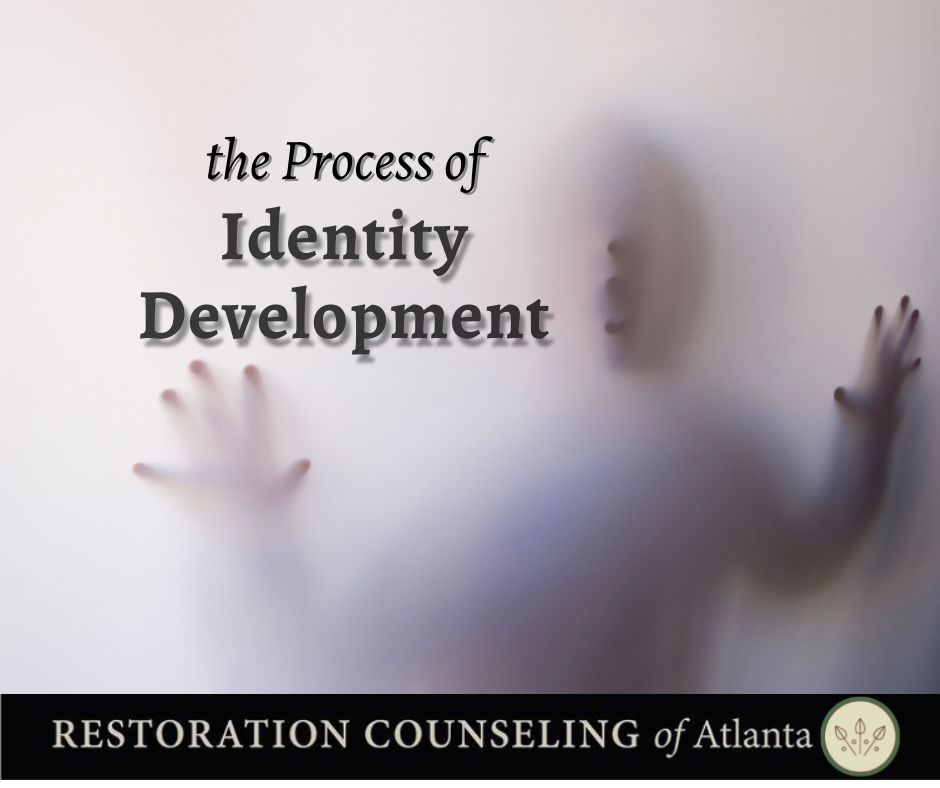Identity development occurs throughout the lifespan. There are aspects of our identity we are born with that are inherent to who we are. Then, there are other aspects of identity, like our beliefs, tastes, or values, that will probably grow and evolve during our lifetime. But how do they grow?
I wonder if a flower is aware of its growth. I do not see the flower grow, but day by day, it emerges and blooms into a flower. This applies to our growth as humans as well. C.S. Lewis has a quote that speaks to this: “Isn’t it funny how day by day nothing changes, but when you look back, everything is different.”
How the Process Works
Below is a proposed process for how our identities develop and evolve throughout our life:
1. Awareness
Awareness is noticing. Noticing when we get butterflies in our stomach as a girl or boy in our class sits near us at the lunch table or tags us while playing during recess. Noticing fear when our chest tightens as we watch the atrocities on the news. Or noticing the heavy sadness on our shoulders when we pass the homeless person on the street. We become aware when we notice the emotions in our bodies and that our emotions lead us to respond.
2. Questions
Often, what comes after noticing and becoming aware is questioning. Why do I feel all those butterflies when that girl or boy is near me? How can I protect my children in a world that feels so unsafe? What can be done to help the poor and vulnerable in my community? Why am I more masculine or feminine than my friends? Do I like this? Or is this uncomfortable?
3. Exploration
Questions turn into exploration. Research begins, and steps are taken to gain understanding. I recently finished reading a book that chronicles the search for an ancient civilization in the rainforest of Honduras. After years of study and research, they used a drone with radar technology to try and identify the ruins of the civilization. They identified three possible locations. Then they sent a small team that included locals who knew the land to survey the sites before sending their entire team into the rainforest. The rainforest is known to have some of the deadliest insects and snakes in the world.
The exploring phase is a lot like how this team searched for the ancient civilization. They researched and sought perspective and clarification by surveying the land using radar technology. They consulted with experts and locals who knew more than they did. The exploring phase in our identity development is similar. We research or try to learn about what we are experiencing, we attempt to survey others’ experiences or other important factors, and we seek counsel from experts, wise friends, or mentors.
4. Experimenting
Once you have explored, you can begin to experiment. Experimenting is the process of trying to decide how you will identify. Will you identify as straight, bi-, or gay? Do you care for the underserved by donating money, addressing the issue in local government, or providing the goods and services needed? Which do you prefer – creativity or competition? Do you see the big picture, or are you more detail-oriented?
The most crucial element to the process of experimenting is trying. The process is similar to when you go to a store to try on clothes. You see what fits, what does not fit, what you like, and what you do not like. Then depending on what feels good for you, you buy the clothes, and you continue to experiment. Maybe you decide the shirt you bought is not the right fit for you? Perhaps you grow out of a shirt, and you need a new shirt, and you decide to try a new style? Maybe you decide you need to add an accessory to an outfit you already have.
5. Identifying
Once you decide what feels good, I believe there is a private identifying first and then a public identifying. A private identifying occurs when a person recognizes and/or identifies who they are. A public identifying is when those around them know about their identity and begin to know who the person is.
Conclusion: Christian Integration
In Paul’s second letter, he says to the Corinthians, “Now the Lord is the Spirit, and where the Spirit of the Lord is, there is freedom. And all of us, with unveiled faces, seeing the glory of the Lord as though reflected in a mirror, are being transformed into the same image from one degree of glory to another; for this comes from the Lord, the Spirit.”
This process of identity development: awareness, questioning, exploring, experimenting, and identifying, I believe, is often the process we go through as we become more like Christ, and we are transformed into his image and move from glory to glory. This process will happen over and over again in life because we will never stop growing or evolving as we become more like Christ. And similar to how the flower grows, we probably will not even recognize when we grow, but we will look up one day and realize everything has changed.
Practical Application Questions
How have you seen this process in your life: awareness, questioning, exploring, experimenting, and identifying? What is your process in each of these stages?
- What stage is most difficult for you? Why?
- What does it mean to trust the process?
- Who are you becoming?
 Written by Ashley Lewis MA, APC
Written by Ashley Lewis MA, APC
Woodstock and Roswell
ashleylewis@restorationcounselingatl.com
Ashley works with adolescents and adults from all backgrounds and provides marriage and premarital counseling. Areas of focus include depression, anxiety, sexual and gender identity concerns, trauma, adoption, anger, and grief.

